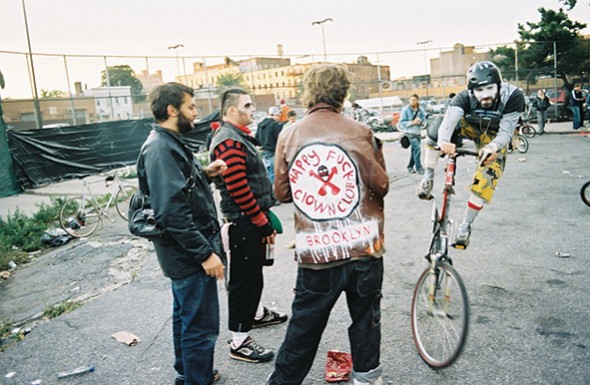
Text by David S. Hirschman
In slow motion through the fog of grainy night-footage, a girl named Alison races on her bicycle toward another girl as a crowd cheers on the curb in a new documentary called B.I.K.E. Predictably, the two collide roughly and are thrown to the blacktop. When the ambulance arrives a few minutes later to load Alison onto a gurney, there is some concern for her safety in the crowd and some cautiously optimistic speculation about her condition intercut with scenes of a raspy singer screaming into a disconnected telephone while strangling himself with the cord.
There’s nothing that says “fuck you” to society like becoming obsessive about a totally irrational and dangerous stunt and tying your existence to others who have a similar death wish. Oh right, of course by “death wish” I mean “desire to create political change by jousting with other art-school grads on double-tall bicycles helmetless while consuming large quantities of beer and heroin.” B.I.K.E., which is about the New York chapter of the Black Label Bike Club (BLBC), might just be destined to be a cult classic for no reason other than the fact that it glorifies the kind of bonehead, adrenaline-rush daredevil stunts that every kid in the suburbs with a skateboard and some angst wants to make their own.
Set against the backdrop of the 2004 Republican Convention in New York City, the film by Anthony Howard and Jacob Septimus at first seems to be about the contentious Critical Mass bike rides and the anti-corporate, anti-consumerist message that many of the bikers espouse. However, it becomes evident that B.I.K.E. is a Fight Club-like paean to the stunt-bike-riding members of the BLBC and their punked-out, underground version of courage and family.
“It’s easy to be once-removed, to sit in a fucking movie theater and watch people blowing each other up and killing each other,” says one biker in the middle of the film. “It’s another thing to put your life on the line. I mean, yeah, enjoying pain is one thing… but it makes you feel alive, it’s like sex that way.”
B.I.K.E. also depicts a curious underground social dynamic as viewers follow Howard in his own attempts to be admitted to the club and his lapses into drug abuse and a mental breakdown. As we see hierarchies form and dissolve among the members of the club, it becomes evident that politics isn’t as important to the bikers as their own social posturing and petty internal dramas.
Finally falling into a trope of traditional storytelling, the film wraps itself together as Howard, rejected by the club, trains a ragtag team of bikers that he dubs the Happy Fuck Clown Club to challenge the BLBC, effectively creating a counterculture to what already seems to be the ultimate in countercultures.
“What’s more important, the [presidential] election or Bike Kill?” Septimus asks Howard, as the two events approach side by side.
For Howard, the answer is easy. “Bike Kill.”

